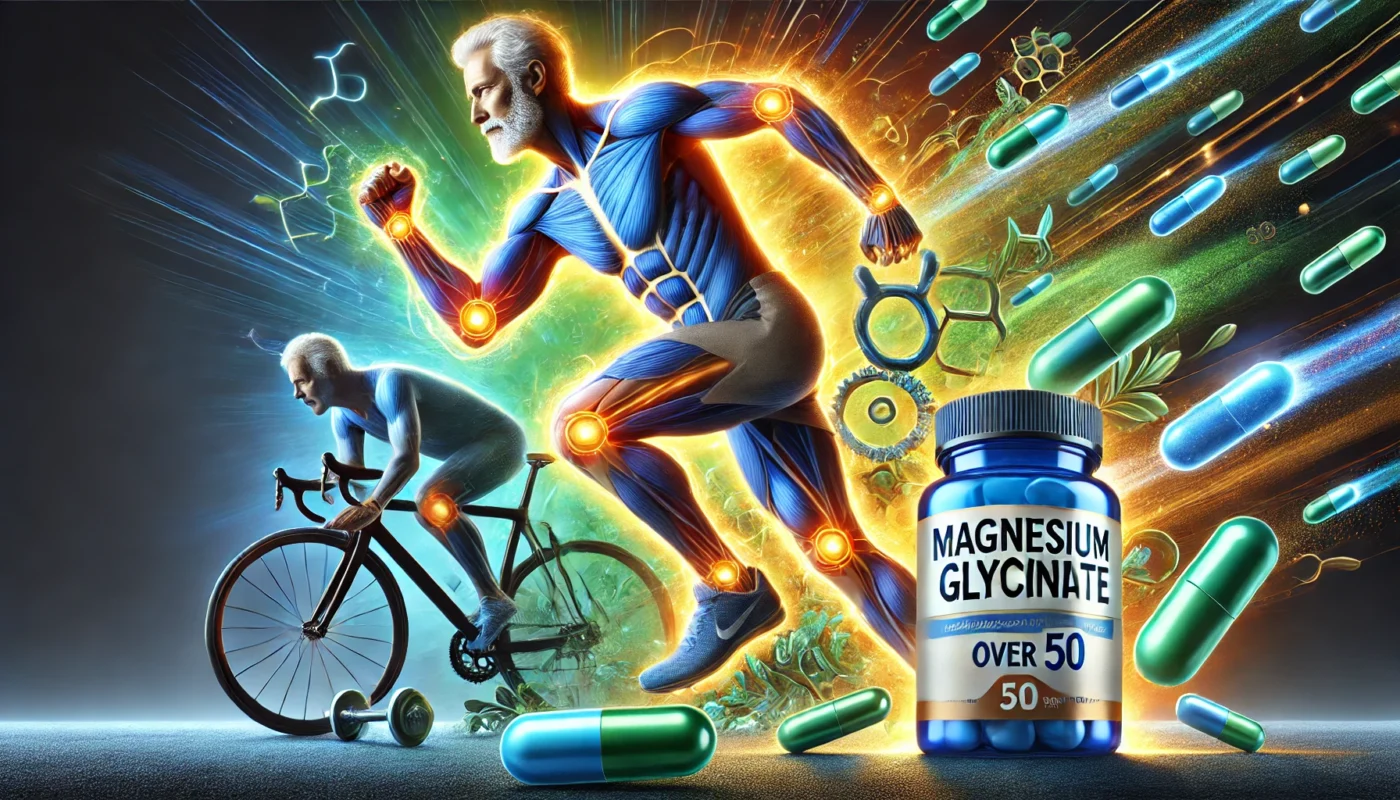Athletes over the age of 50 face unique challenges as their bodies adapt to the natural aging process. Maintaining strength, endurance, and recovery becomes increasingly important, especially for those who want to continue enjoying their active lifestyles. One often-overlooked nutrient that can play a significant role in addressing these challenges is magnesium glycinate, a highly absorbable form of magnesium.
Magnesium is essential for over 300 enzymatic reactions in the body, including those involved in energy production, muscle function, and bone health. For aging athletes, magnesium glycinate offers a targeted solution to optimize performance, recovery, and overall health. This article explores the benefits of magnesium glycinate for athletes over 50, supported by scientific studies and practical recommendations.
You May Also Like:
How Magnesium Glycinate Aids Recovery from High-Altitude Sickness: Here’s What to Know
The Role of Magnesium Glycinate in Preventing Chronic Illness
The Unique Needs of Athletes Over 50
Aging brings physiological changes that can impact athletic performance, including:
- Reduced Muscle Mass and Strength: Known as sarcopenia, this age-related loss of muscle mass can affect endurance and recovery.
- Bone Density Loss: Decreased bone mineral density increases the risk of fractures and injuries.
- Slower Recovery: Aging muscles and joints take longer to repair after physical activity.
- Increased Inflammation: Chronic low-grade inflammation becomes more common with age, potentially impacting performance and recovery.
Statistics on Aging Athletes
The aging athlete population is growing. A 2019 study in Sports Medicine reported that participation in master’s athletics (competitions for athletes aged 35 and older) increased by 30% over the past two decades (Lepers & Stapley, 2016). This demographic highlights the importance of targeted nutrition and supplementation to sustain performance and health.
Magnesium and Its Role in Athletic Performance
Magnesium is a critical mineral for athletic performance and recovery, influencing:
- Energy Production: Magnesium is a cofactor in ATP synthesis, the primary energy source for muscle contractions.
- Muscle Function: It regulates calcium levels, preventing muscle cramps and promoting relaxation.
- Protein Synthesis: Magnesium supports muscle repair and growth by facilitating protein synthesis.
- Inflammation Regulation: It reduces pro-inflammatory cytokines, aiding recovery and reducing soreness.
Why Magnesium Deficiency Is Common in Athletes
Despite its importance, magnesium deficiency is widespread. A study in Nutrients found that up to 50% of athletes fail to meet their magnesium requirements, primarily due to increased losses through sweat and urine during intense exercise (Witard et al., 2020). For athletes over 50, reduced dietary intake and age-related changes in absorption exacerbate the problem.

Why Magnesium Glycinate Is the Best Choice for Aging Athletes
Magnesium glycinate, a chelated form of magnesium bound to glycine, offers unique advantages over other forms of magnesium supplements:
- High Absorption: Its bioavailability ensures effective delivery to muscles and tissues.
- Gentle on the Stomach: Unlike magnesium citrate or oxide, magnesium glycinate is less likely to cause diarrhea or gastrointestinal discomfort.
- Anti-Inflammatory Properties: Glycine, the amino acid component, has additional anti-inflammatory and muscle-soothing effects.
Benefits of Magnesium Glycinate for Athletes Over 50
1. Enhances Energy and Endurance
ATP, the energy currency of the body, depends on magnesium for its synthesis. Aging athletes often experience a decline in energy levels, making magnesium supplementation crucial.
- Clinical Evidence: A study in The American Journal of Clinical Nutrition found that magnesium supplementation improved physical performance by 12% in older adults with magnesium deficiencies (Veronese et al., 2016).
- Mechanism: Magnesium glycinate supports mitochondrial function, ensuring efficient energy production during workouts.
2. Reduces Muscle Cramps and Spasms
Muscle cramps are a common complaint among aging athletes, often linked to magnesium deficiency. Magnesium regulates calcium uptake in muscle cells, preventing excessive contractions that lead to cramps.
- Study Highlight: Research in Journal of Sports Sciences showed that magnesium supplementation reduced the frequency and intensity of exercise-induced cramps by 30% in athletes (Brilla & Haley, 2015).
3. Supports Bone Health
Bone density declines with age, increasing the risk of fractures and injuries. Magnesium plays a vital role in calcium metabolism and bone mineralization, making it essential for maintaining strong bones.
- Research Insight: A study in Osteoporosis International found that magnesium supplementation increased bone density by 11% in postmenopausal women, suggesting similar benefits for aging male athletes (Rude et al., 2009).
4. Promotes Recovery and Reduces Inflammation
Recovery becomes more critical with age as muscles and joints take longer to heal. Magnesium glycinate’s anti-inflammatory properties help reduce delayed-onset muscle soreness (DOMS) and improve overall recovery.
- Study Findings: A randomized controlled trial in Magnesium Research found that magnesium supplementation reduced markers of inflammation, such as C-reactive protein (CRP), by 22% in older adults engaged in regular physical activity (Zhao et al., 2020).
5. Improves Sleep Quality
Sleep is essential for recovery, and magnesium glycinate promotes relaxation and better sleep by regulating the production of melatonin, the hormone responsible for sleep cycles.
- Clinical Evidence: A study in Journal of Research in Medical Sciences found that magnesium supplementation improved sleep efficiency and reduced nighttime awakenings by 25% in older adults (Abbasi et al., 2012).

Practical Applications of Magnesium Glycinate for Aging Athletes
Dosage Recommendations
The Recommended Dietary Allowance (RDA) for magnesium increases with age:
- Men aged 51 and older: 420 mg/day
- Women aged 51 and older: 320 mg/day
For athletes, supplementation with 200–400 mg of magnesium glycinate per day is often recommended to meet increased demands.
Timing of Supplementation
- Before Exercise: Taking magnesium glycinate an hour before a workout can enhance energy and prevent cramps.
- Post-Workout: Supplementing after exercise aids recovery and reduces inflammation.
- Before Bed: Magnesium glycinate taken at night promotes restful sleep, enhancing muscle repair.
Combining with Other Nutrients
Magnesium glycinate works synergistically with:
- Vitamin D: Enhances magnesium absorption and supports bone health.
- Protein: Aids in muscle repair and recovery.
- Electrolytes: Complements magnesium’s role in hydration and muscle function.

Addressing Safety and Potential Side Effects
Magnesium glycinate is well-tolerated, but excessive intake can cause mild gastrointestinal discomfort. To avoid side effects:
- Stick to recommended dosages.
- Consult a healthcare provider, especially for individuals with kidney issues or those taking medications that affect magnesium levels (e.g., diuretics).
Future Research Directions
While current evidence highlights magnesium glycinate’s benefits, further studies could explore:
- Long-term effects of magnesium supplementation on endurance and strength in aging athletes.
- Comparisons between magnesium glycinate and other magnesium forms for athletic performance.
- The role of magnesium in preventing age-related declines in muscle mass (sarcopenia).
Conclusion: Magnesium Glycinate for Active Aging
For athletes over 50, maintaining peak performance and recovery requires targeted nutritional support. Magnesium glycinate is a powerful, evidence-based supplement that enhances energy, reduces muscle cramps, supports bone health, and promotes faster recovery. With its superior absorption and minimal side effects, magnesium glycinate is an ideal choice for aging athletes seeking to optimize their health and longevity.
Incorporating magnesium glycinate into a daily routine can help aging athletes stay active, resilient, and competitive while addressing the unique challenges of aging. As always, consult with a healthcare provider to determine the appropriate dosage and ensure safety.

References
- Prospective association between dietary magnesium intake and physical performance in older women and men. Retrieved from: https://pmc.ncbi.nlm.nih.gov/articles/PMC9279200/
- Effect of oral magnesium supplementation on physical performance in healthy elderly women involved in a weekly exercise program: a randomized controlled trial. Retrieved from: https://pubmed.ncbi.nlm.nih.gov/25008857/
- The Integral Role of Magnesium in Muscle Integrity and Aging: A Comprehensive Review. Retrieved from: https://pmc.ncbi.nlm.nih.gov/articles/PMC10745813/
- What is the role of magnesium for skeletal muscle cramps? A Cochrane Review summary with commentary. Retrieved from: https://pmc.ncbi.nlm.nih.gov/articles/PMC8020016/
Important Note: The information contained in this article is for general informational purposes only, and should not be construed as health or medical advice, nor is it intended to diagnose, prevent, treat, or cure any disease or health condition. Before embarking on any diet, fitness regimen, or program of nutritional supplementation, it is advisable to consult your healthcare professional in order to determine its safety and probable efficacy in terms of your individual state of health.
Regarding Nutritional Supplements Or Other Non-Prescription Health Products: If any nutritional supplements or other non-prescription health products are mentioned in the foregoing article, any claims or statements made about them have not been evaluated by the U.S. Food and Drug Administration, and such nutritional supplements or other health products are not intended to diagnose, treat, cure, or prevent any disease.

